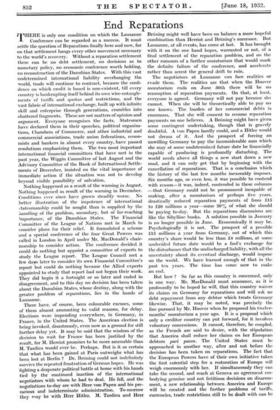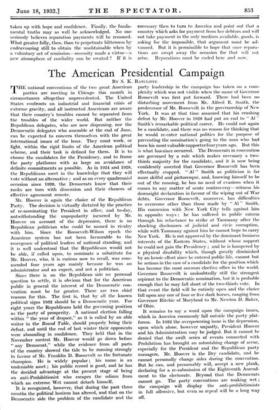End Reparations
settle the question of Reparations finally here and now, for on that settlement hangs every other movement necessary to the world's recovery. Without a reparation settlement there can be no debt settlement, no decisions as to monetary policy, no economic conference worth holding, no reconstruction of the Danubian States. With this vast undetermined international liability overhanging the world, trade will continue to contract, because the confi- dence on which credit is based is non-existent, till every country is bankrupting itself behind its own wire-entangle- ments of tariffs and quotas and restrictions, and the vast fabric of international exchange, built up with infinite skill and enterprise through generations, crumbles into shattered fragments. These are not matters of opinion and argument. Everyone recognizes the facts. Statesmen have declared them in their speeches, political organiza- tions, Chambers of Commerce, and other industrial and commercial associations, trade union federations, econo- mists and bankers in almost every country, have passed resolutions emphasizing them. The two most important international financial committees that have met in the past year, the Wiggin Committee of last August and the Advisory Committee of the Bank of International Settle- ments of December, insisted on the vital importance of immediate action if the situation was not to develop beyond visible possibility of salvation.
Nothing happened as a result of the warning in August. Nothing happened as result of the warning in December. Conditions ever since have grown steadily worse. No better illustration of the impotence of international statesmanship could be sought than is supplied by the :tandling of the problem, secondary, but of far-reaching !mportance, of the Danubian States. The Financial Committee of the League of Nations met in March to consider plans for their relief. It formulated a scheme and a special conference of the four Great Powers was called in London in April under Mr. MacDonald's chair- manship to consider action. The conference decided it could do nothing but appoint a committee of experts to study the League report. The League Council met a few days later to consider its own Financial Committee's report but could do nothing because the Allied experts appointed to study that report had not begun their work. They did begin it a fortnight or so later and ended in disagreement, and to this day no decision has been taken about the Danubian States, whose destiny, along with the greater problem of reparations, lies in the hands of Lausanne.
There have, of course, been colourable excuses, some of them almost amounting to valid reasons, for delay. Elections were impending everywhere, in Germany, in France, in the United States. The American election is being invoked, disastrously, even now as a ground for still further delay yet. It may be said that the wisdom of the decision to wait for France has been justified by the result, for M. Herriot promises to be more amenable than M. Tardicu would ever be. Perhaps. But is it so certain that what has been gained at Paris outweighs what has been lost at Berlin ? Dr. Bruning could not indefinitely survive the repeated frustration of German hopes. He was fighting a desperate political battle at home with his hands tied by the continued inaction of the international negotiators with whom he had to deal. He fell, and the negotiations to-day are with Herr von Papen and his pre- carious and indeterminate administration. To-morrow they may be with Herr Hitler. M. Tardieu and Herr
ITHERE is only one condition on which the Lausanne Bruning might well have been on balance a more hopeful -I- Conference can be regarded as a success. It must combination than Herriot and BrUning's successor. But
Lausanne, at all events, has come at last. It has brought with it on the one hand hopes, warranted or not, of a final settlement of the reparation problem, and on the other rumours of a further moratorium that would mark the definite failure of the conference, and accelerate rather than arrest the general drift to ruin.
The negotiators at Lausanne can face realities or evade them. The realities are that when the Hoover moratorium ends on June 80th there will be no resumption of reparation payments. On that, at least, everyone is agreed. Germany will not pay because she cannot. When she will be theoretically able to pay no one knows. The burden of her commercial debts is enormous. That she will consent to resume reparation payments no one believes. A Bruning might have given some contingent undertaking, though that is gravely doubtful. A von Papen hardly could, and a Hitler would not dream of it. And the prospect of forcing an unwilling Germany to pay the inconsiderable sum which she may at some undetermined future date be financially .capable of producing is profoundly disturbing. The world needs above all things a new start down a new road, and it can only get that by beginning with the cancellation of reparations. That is a conclusion which the history of the last few months inexorably imposes. Six months ago, or even less, it was possible to contend with reason—it was, indeed, contended in these columns —that. Germany could not be pronounced incapable of making, after a moratorium of perhaps five years, drastically reduced reparation payments of from £15 to £20 millions a year—some 20% of what she should be paying to-day. But the reparations discussions are like the Sibylline books. A solution possible in January is no longer possible in June. Economically it may be. Psychologically it is not. The prospect of a possible £15 millions a year from Germany, out of which this country's share would be less than £4 millions, at some undecided future date would be a fool's exchange for the disturbance that the undischarged liability, with all the uncertainty about its eventual discharge, would impose on the world. We have learned enough of that in the past ten years. The time has come now to make an end.
But how ? So far as this country is concerned, only in one way. Mr. MacDonald must announce, as it is profoundly to be hoped he will, that this country waives its claims on Germany for reparations and will ask no debt repayment from any debtor which treats Germany likewise. That, it may be noted, was precisely the line pursued by Mr. Hoover when he proposed his twelve- months' moratorium a year ago. It is a proposal which only a creditor country can put forward, for it involves voluntary concessions. It cannot, therefore, be coupled, as the French are said to desire, with the stipulation that America shall reduce her claims on her European debtors pari passe. The United States must be approached in another way, after and not before the decision has been taken on reparations. The fact that the European Powers have of their own initiative taken the first essential step for a restoration of Europe will weigh enormously with her. If simultaneously they can take the second, and reach at Geneva an agreement em- bodying genuine and not fictitious decisions on disarma- ment, a new relationship between. America and Europe will be created and the further problems of tariffs, currencies, trade restrictions still to be dealt with can be taken up with hope and confidence. Finally, the funda- mental truths may as well be acknowledged. No one seriously believes ,reparation payments will be resumed. What greater folly, then, than to perpetuate bitterness by endeavouring still to obtain the unobtainable when by a voluntary act of remission—necessity made a virtue—a pew atmosphere of cordiality can be created ? If it is necessary then to turn to America and point out that a country which asks for payment from her debtors and will not take payment in the only medium available, goods, is asking for the impossible, that argument must be ad- vanced. But it is permissible to hope that once repara- tions arc swept away the occasion for that will not arise. Reparations must be ended here and now.









































 Previous page
Previous page